
Key Takeaways
- DEXs offer greater privacy and control but may have higher fees
- CEXs provide better liquidity and user experience but require KYC
- New Zealand users have access to both types of exchanges
- Your choice depends on trading volume, privacy needs, and experience level
- Consider using both types for different purposes
Understanding DEX vs. CEX: A Guide for Kiwi Traders
Popular DEXs for Kiwi Traders
Uniswap
The most popular Ethereum-based DEX with simple swapping interface.
Best for: Ethereum tokens, high liquidity
PancakeSwap
Popular DEX on Binance Smart Chain with lower fees.
Best for: BNB Chain tokens, lower fees
Popular CEXs for Kiwi Traders
Binance
Largest global exchange with extensive features and trading pairs.
Best for: Wide selection, advanced trading
Easy Crypto
New Zealand-based exchange with NZD support and local customer service.
Best for: NZ users, beginners, local support
Which Exchange Type is Right for You?
Consider a DEX if you:
- ✓ Value privacy and don't want to complete KYC
- ✓ Prefer to maintain control of your private keys
- ✓ Want access to new tokens not yet listed on CEXs
- ✓ Are comfortable with more technical interfaces
Consider a CEX if you:
- ✓ Are new to cryptocurrency trading
- ✓ Want to trade with NZD directly
- ✓ Need customer support and user-friendly interfaces
- ✓ Prefer lower trading fees and higher liquidity
Conclusion
For most Kiwi traders, a combination approach works best. Use a reputable CEX like Easy Crypto or Binance for converting NZD to cryptocurrency and trading major coins. Then, if needed, transfer to a DEX for access to newer tokens or privacy-focused trading. Your choice ultimately depends on your trading goals, technical comfort level, and privacy requirements.
Ready to Learn More?
Continue your crypto journey with our comprehensive guides for New Zealand investors.
📚 Read Next: How to buy Crypto in NZ →